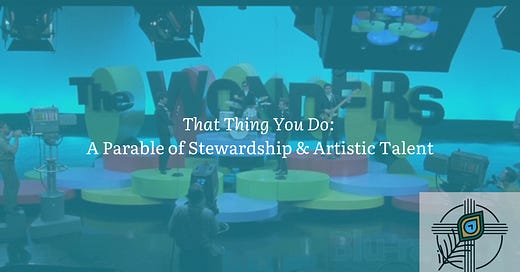Note: By necessity, extensive spoilers for the 1996 Tom Hanks classic That Thing You Do follow.
My dad has a collection of movie tickets, each representing a film we’ve seen together since the first time he took me to the movies (it was An American Tail, and I was two). The list of memories I have of seeing movies on the big screen with him is massive, ranging from Beauty & the Beast to The Green Mile to No Country for Old Men to anniversary showings of Lawrence of Arabia and Citizen Kane.
However, none of these experiences compare to when he took me to see That Thing You Do.
That Thing You Do is a unique notch in Tom Hanks’s body of work because it was a passion project that he wrote, directed, and starred in.1 It chronicles the meteoric rise of the Wonders, a local rock band from Erie, Pennsylvania, which is catapulted into the national spotlight of the 1960s. After a song they wrote in their garage snags the attention of a major label, they land a hit record, go on tour, and garner a massive following of screaming teenage girls, all in a matter of weeks.
The Wonders are a diverse and entertaining bunch of personalities. There’s lead singer Jimmy, who has fanatical and perfectionistic standards for his songs; Lenny, the impulsive, goofball guitar player; and the Bass Player, who’s never given an actual name and is mainly driven by his ambition of joining the Marines.
And, of course, there’s drummer Guy Patterson, who practices along with records by his favorite jazz artists in the basement of his family’s appliance store and dreams of doing something more with his life.
At first, fame seems to be all that the four young men have dreamed of, but as is so often the case, it comes at a cost. They discover that fame is temporary and that it takes more than hit records, multi-state tours, and, yes, even beautiful girls to sustain it.
Ultimately, as quickly as their renown comes, it begins to disintegrate. The Bass Player goes AWOL on the day of the band’s debut on a national television show and winds up at Disneyland with a bunch of Marines.
Lenny runs off for a quickie Vegas wedding with their record company’s receptionist, who is also a Playboy bunny.
Jimmy has a meltdown over lack of control over his music. His girlfriend, Faye, who has been touring with them, dumps him because of his massive ego. Finally, he quits the band in an explosively snarky declaration to their producer and manager (played by Hanks).
After that initial screening with Dad, I was obsessed with That Thing You Do. My friends and I listened to the CD so often that it got too scratched to play. I was fascinated by my dad’s own stories of playing drums professionally throughout the 1960s. Today, he and I can pretty much quote the entire movie, and I even own the soundtrack on vinyl.
Most importantly—and surprisingly—when I was barely a teenager, long before I became a Christian, the Wonders taught me about stewardship—the wise use of the resources God has given us for His glory.
The scriptures include countless commands about this theme, but none is more famous than the Parable of the Talents, spoken by the Lord Jesus in Matthew 25:14-30. I quote it here at length:
“For it will be like a man going on a journey, who called his servants and entrusted to them his property. To one he gave five talents, to another two, to another one, to each according to his ability. Then he went away. He who had received the five talents went at once and traded with them, and he made five talents more. So also he who had the two talents made two talents more. But he who had received the one talent went and dug in the ground and hid his master's money. Now after a long time the master of those servants came and settled accounts with them. And he who had received the five talents came forward, bringing five talents more, saying, ‘Master, you delivered to me five talents; here, I have made five talents more.’ His master said to him, ‘Well done, good and faithful servant. You have been faithful over a little; I will set you over much. Enter into the joy of your master.’ And he also who had the two talents came forward, saying, ‘Master, you delivered to me two talents; here, I have made two talents more.’ His master said to him, ‘Well done, good and faithful servant. You have been faithful over a little; I will set you over much. Enter into the joy of your master.’ He also who had received the one talent came forward, saying, ‘Master, I knew you to be a hard man, reaping where you did not sow, and gathering where you scattered no seed, so I was afraid, and I went and hid your talent in the ground. Here, you have what is yours.’ But his master answered him, ‘You wicked and slothful servant! You knew that I reap where I have not sown and gather where I scattered no seed? Then you ought to have invested my money with the bankers, and at my coming I should have received what was my own with interest. So take the talent from him and give it to him who has the ten talents. For to everyone who has will more be given, and he will have an abundance. But from the one who has not, even what he has will be taken away. And cast the worthless servant into the outer darkness. In that place there will be weeping and gnashing of teeth.’”
Christ’s words present a sobering reality: We are responsible for using what He has given us wisely and serving Him faithfully as we await His return. Those who do so will be commended and trusted with much more in His Kingdom. But those who do not will be held accountable for not stewarding God’s gracious gifts well.
When I watch That Thing You Do, I can’t help but see it through the lens of this parable. What causes the Wonders’ downfall isn’t a question of talent—they are skilled, creative musicians who play together with technical proficiency. What it comes down to, though, is how they use their giftedness and who benefits the most from their efforts.
We get our answer to this question just before the film’s end credits. The movie concludes with an epilogue outlining what happened to each member after the band’s short but intense burst of fame.
After serving in Vietnam, the Bass Player became a building contractor in Florida, never to play music again.
Lenny went through what is intimated to be a revolving door of marriages (“He is currently single”) and ended up managing a casino.
Jimmy started his own band, made three gold albums for the Wonders’ label, and then became a successful record producer.
But Guy’s flash forward is the most telling. He married Faye, and they raised four children and founded a music school together in Washington State.
The Bass Player’s pursuit of a military career is noble, but he flings himself into it at the expense of a commitment to his friends. Appropriately enough, Lenny literally gambles his musical aptitude away. Jimmy achieves his goal of being respected in the music business, but at the cost of any lasting legacy.
But Guy, perhaps the most gifted of all, chooses to use his talent to pursue meaningful community, family, and mentor relationships over fame or artistic renown. He still plays music but steps out of the spotlight to teach and invest in others.
He isn’t the one who ends up with a gold record. He ends up with something better.
It reminds me of Peter’s words: “Each of you should use whatever gift you have received to serve others, as faithful stewards of God’s grace in its various forms” (1 Peter 4:10).
Of course, I must emphasize that films are not scripture, and the Bible is the paramount source of this wisdom. Yet, That Thing You Do, together with Jesus’s parable, compels me to think about what kind of writer I want to be.
Do I want to be the unwise servant who buries my talent, using it for selfish ambition or simply discarding it altogether?
Or do I want to be the good servant who submits to the Lord’s will and seeks to be wise with what He’s given me and to bless others?
Tom Hanks’s words to Guy at the end of the film sum this up nicely:
“You know, Horace was right about you, Guy,” he says. “You are the smart one. Lenny is the fool, Jimmy is the talent [. . . ] And you are the smart one. That's what I think, anyway.”
But what is most important, what overshadows this theme of stewardship and transcends any movie plot, is the truth that underlies the Parable of the Talents: the Master’s imminent return is our primary motivation for stewardship, as we will answer to Christ for our faithfulness with what He’s blessed us with:
“For we must all appear before the judgment seat of Christ, so that each one may receive what is due for what he has done in the body, whether good or evil” (2 Corinthians 5:10).
We should all desire to hear him say, “Well done, good and faithful servant. You have been faithful over a little; I will set you over much. Enter into the joy of your master.”
So, are you a fan of That Thing You Do? Drop your favorite lines in the comments—or any other thoughts you have regarding the stewardship of our gifts.
Tom Hanks wrote the screenplay for fun while on a promotional tour for Forrest Gump with director Robert Zemeckis. The experience was pretty boring—he went in front of various press audiences, answered some questions, waved, and then went on to the next location. One has to wonder whether the famous scene in That Thing You Do where the Wonders hold a press conference at their label with the sole purpose of kissing the ring of its founder was inspired by this experience.














Share this post